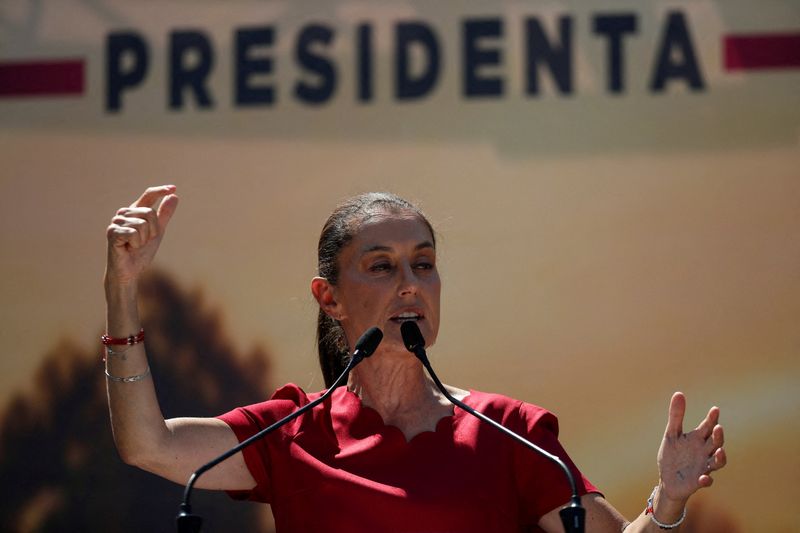By Ana Isabel Martinez and Adriana Barrera
MEXICO CITY (Reuters) – Mexico’s presidential front-runner Claudia Sheinbaum plans to invest in state-owned Pemex’ oil refineries to reduce the huge volumes of low-value fuels produced and instead boost the output of motor fuels, one of her advisors said.
Pemex has been producing record levels of heavy fuels, such as the particularly polluting fuel oil, as its local refineries struggle to process the heavy Maya crude it pumps.
Last year, Pemex produced 260,285 barrels per day (bpd) of fuel oil – exceeding the production of gasoline at 252,203 bpd.
Considered a waste product, in Mexico fuel oil is mainly burnt for electricity generation.
“Refineries are very expensive and important assets to reach energy self-sufficiency,” said Jorge Islas, the energy coordinator for Sheinbaum, in an interview on Wednesday.
Islas, a physicist and doctor in economics, pointed to the possibility of building a new coking unit at the Salamanca refinery to increase gasoline and diesel production. Currently, the refinery is operating at just over half of its capacity.
Coking units are able to process the heavier hydrocarbons coming out of distillation towers into higher-value products, including motor fuels.
Under President Andres Manuel Lopez Obrador, Pemex has invested billions of dollars to rehabilitate its six obsolete domestic refineries. Refining has been a loss-making business for Pemex for years.
In order to wean the country off expensive imports, Pemex also formally inaugurated the new Dos Bocas refinery in July 2022, despite running late and over budget by several billions of dollars. While the 340,000-bpd refinery is operational, it does not yet produce finished fuels.
Pemex already has two new coking plants in Salamanca and Tula which are expected to come into operation between this year and next.
Lopez Obrador had promised that Mexico would achieve “energy sovereignty” during his six-year term. However, a few months before he leaves office on Oct. 1, the goals seem complex to achieve even as refineries have improved their performance.
The six local refineries together have the capacity to process 1.6 million bpd. However, in the first two months of this year, they processed an average of 945,000 bpd – above the 612,000 bpd in 2018 they processed before Lopez Obrador took office but still well below capacity.
With the Dos Bocas refinery set to fully operate this year, and Pemex also wanting more crude for its other refineries, it has asked its commercial unit TRI to cut crude exports this month by 436,000 bpd.
The government plans to continue reducing its exports, which amounted to 945,000 bpd in the first two months of this year.
Islas reiterated that according to Sheinbaum’s plan, production would be at around 1.8 million bpd of and condensate even after there have been few large discoveries of reserves.
“Smaller reserves are being discovered each time, at greater depth, with higher costs,” said Islas.
“What is being thought about is the energy transition from fossils to renewables,” he said. “Maintain a fixed hydrocarbon production platform, make better use of the energy and cover the new demand with renewable energy.”

Asked about the finances of the highly indebted Pemex, Islas said that a Sheinbaum government would look for “aid schemes” and “better options”.
“But support can’t be eternal and the company must improve, show it can be accountable,” he said.

